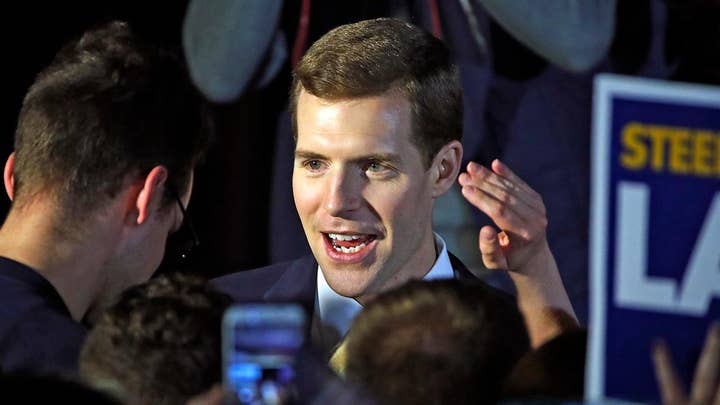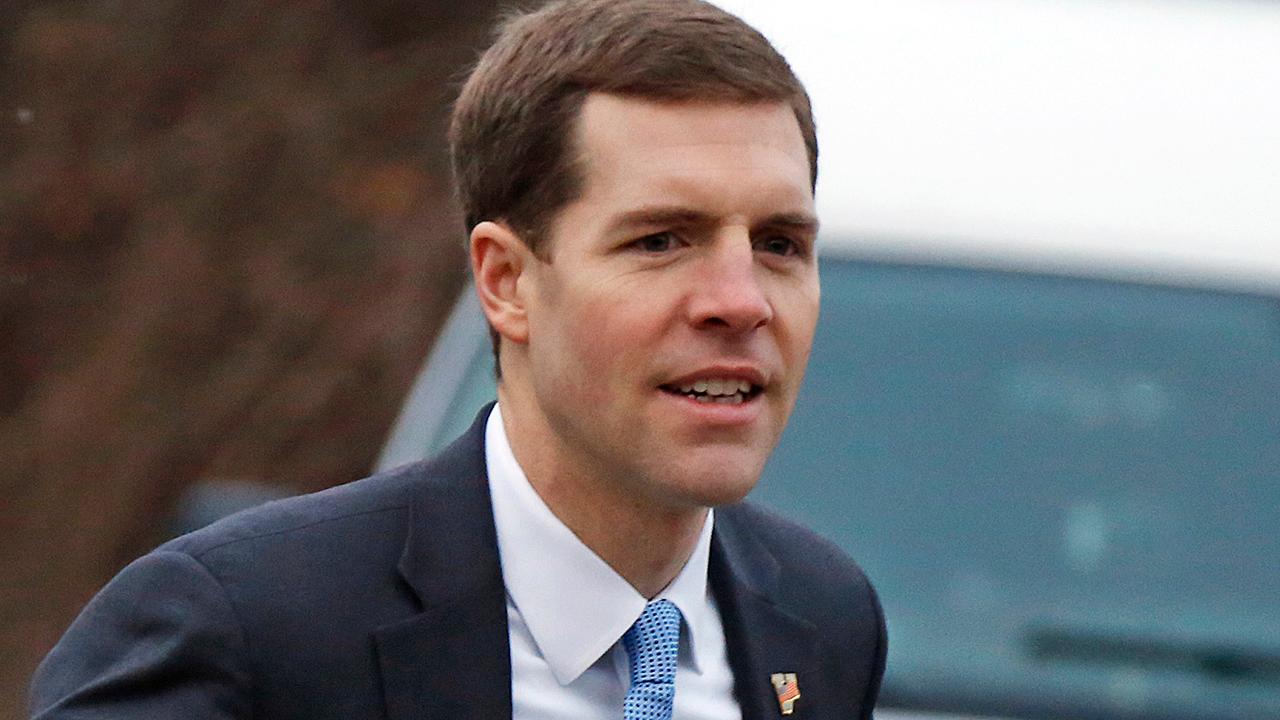Lessons to be learned from Pennsylvania special election
The race between Rick Saccone and Conor Lamb has yet to be called, but political analysts are already drawing conclusions; insight from Bill Barrow, national politics reporter for the Associated Press.
The Buffalo Bills made it to four, consecutive Super Bowls.
The Bills never won.
But they were close.
In the late 1960s, the St. Louis Blues made to three consecutive Stanley Cup Finals.
The Blues never won.
But they were close.
Results in the special election to succeed former Rep. Tim Murphy, R-Pa., in southwestern Pennsylvania aren’t official yet. Pennsylvania’s 18th is the quintessential “Trump district.” Steel and coal. A seat Republicans held for a couple of decades. President Trump carried the district by 19 points in 2016.
PA SPECIAL ELECTION MAY SEE RECOUNT
Yet Democrat Conor Lamb leads Republican Rick Saccone by the thinnest of margins. Lamb may very well capture the seat outright soon.
“I think the president helped close this race,” said House Speaker Paul Ryan, R-Wis. “To get it where it is - within a few hundred votes.”
Rick Saccone may not win.
But he was close.
Democrats know a lot about “close” special elections for House seats. Democrats faced uphill climbs in special elections last year in Kansas, Montana, Georgia and South Carolina. All were solid Republican seats. Yet Democrats somehow converted each seat into an opportunity for a pickup. Democrats played in each one. The Georgia contest was most-compelling. Karen Handel, R-Ga., narrowly dispatched Democrat Jon Ossoff.
Democrats never recorded a single victory.
But they were close.
This is the thesis of elections in 2017 and 2018: close.
The seats Republicans won never should have been close. And the Pennsylvania seat the Democrats may yet win should never have been close.
Here’s the problem for both sides heading into the midterms. Democrats need to win some of those GOP-entrenched seats if they’re going to seize the House. They just can’t be “close.” By the same token, Republicans can’t go around saying they may have lost the Pennsylvania contest they should have won. But at least they made it “close.”
Both sides are mollycoddling their own predicaments with this talk. This is politics, not horseshoes.
“Winning isn’t everything,” said the fabled Green Bay Packers Head Coach Vince Lombardi. “It’s the only thing.”
House Republicans met for their weekly GOP conference meeting early Wednesday morning at the Capitol Hill Club in the shadow of the Cannon House Office Building. After the Pennsylvania exercise, some Republicans may contemplate their futures this fall.
Ryan’s message to skittish Republicans about the midterms?
“We have a great track record. Look at what’s going on with the tax law,” proffered the speaker.
Why did Democrats do so well in the race?
“There are more Democrats in that district than Republicans,” replied the speaker.
But that doesn’t explain why the district voted Republican for so long,
“He ran on a Republican message,” said Rep. Chris Collins, R-N.Y., about Lamb. “He ran as a Republican.”
This is the thesis of elections in 2017 and 2018: close. The seats Republicans won never should have been close. And the Pennsylvania seat the Democrats may yet win should never have been close.
In other words, the GOP narrative resonated with that bastion of Democrats in southwest Pennsylvania.
“This is kind of a one-off,” said Collins of the Pennsylvania contest. He noted that the GOP vanquished Democrats in several other competitive special elections.
If the Pennsylvania race isn’t a “one-off,” some House GOPers may ponder what may be more fun that being a Republican on the ballot in November. Doing spin control for Education Secretary Betsy DeVos? Serving as legal counsel for Sam Nunberg as he defies a special counsel subpoena on national television? Watching Mr. Trump’s Twitter feed to assess your employment status?
Republicans long tempered expectations for the Pennsylvania race. They complained about Saccone’s campaign strategy. They carped about Saccone’s fundraising. Now they’ll fret about how much money the GOP sunk into the race in Republican territory. They’ll question the wisdom of their vote to repeal and replace Obamacare (which never went anywhere. The House approved the measure. The Senate never synched up). They’ll agonize over their vote for tax reform - and Ryan’s gambit to market the tax law - especially in districts like this one in southwestern Pennsylvania.
It’s truly unclear if the Pennsylvania race is a bellwether. But Lamb’s success may give Democrats hope. Democrats struggled since 2008 to capture seats with moderate to conservative Democrats in red, rural areas. Democrats won the House in 2006 thanks to Democratic successes beyond traditional Democratic strongholds. Democrats have scored few successes in any of these districts over the past decade.
Then 2017 hit. The pile of special election losses began to rent space in the Democrats’ heads. It played mind games with Democrats as they repeatedly came close in seats they never should win.
House Minority Leader Nancy Pelosi, D-Calif., wasn’t on the ballot in the 18th Congressional District of Pennsylvania. Nor was Donald Trump. But both parties truly “nationalized” the race by associating the candidates with Pelosi and Trump.
Republicans wanted to portray Lamb as a sheep for Pelosi. GOPers deployed that maneuver since 2010. Pelosi is toxic outside of liberal districts. Pelosi can’t stump for candidates in districts like Pennsylvania’s 18th – the very places Democrats need to win. House Democrats directed lots of recriminations toward Pelosi after they failed to win earlier special elections. Pelosi faced similar criticism after Democrats didn’t put a dent in the GOP House majority in 2016. A prospective Lamb win would quash Democratic sniping about Pelosi. But ironically, Lamb says he won’t support the California Democrat. And Democrats may need more Conor Lambs to take the House – Conor Lambs who buck Pelosi for Speaker.
By the same token, President Trump was a factor here. The president parachuted into Moon Township, Pennsylvania to rally for Saccone over the weekend. Mr. Trump has struck out when giving full-throated endorsements to other candidates. President Trump first endorsed former Sen. Luther Strange, R-Ala., in Alabama’s GOP primary. Strange then lost to Roy Moore. The President then backed Moore. Moore lost to Sen. Doug Jones, D-Ala. The president touted how he helped Strange but then browbeat the senator for losing. Mr. Trump also distanced himself from Moore after Jones won.
Mr. Saccone? May I introduce you to Mr. Tillerson?
Close races are a part of politics. But there are winners and losers.
Rep. Martha McSally, R-Ariz., got to Congress nearly five years ago when she sent former Rep. Ron Barber, D-Ariz., packing by a mere 167 votes.
Former Rep. Bob Beauprez, R-Colo., scored a ticket to Washington after edging out Democrat Mike Feely by 121 votes in 2002.
But the chef-d'œuvre in tight House races belongs to former Rep. Sam Gejdenson, D-Conn.
Republicans captured the House in the historic, 1994 midterm. But on election night, it appeared that Gejdenson managed to defy the GOP wave. Gejdenson defeated Republican challenger Edward Munster (yes, that was the name) by a mere four votes. After weeks of canvassing and trips to court, officials declared Gejdenson the winner in a landslide: 21 votes.
Edward Munster never won.
But he was close.
















































